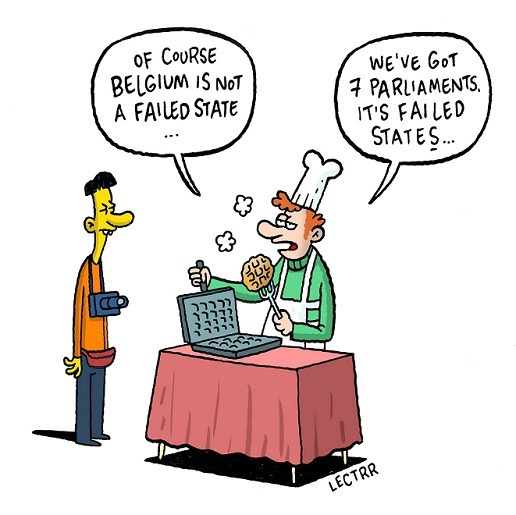This is the first in a series of articles that look at the Belgian political machinery with suggestions on how best to reform it.
To say that Belgium has too many governments, ministers and state secretaries would ordinarily arouse no more controversy than to say fruit and vegetables are good for you.
For its 11.3 million people, Belgium has seven parliaments: one federal, three for the regions (Flanders, Wallonia and Brussels) and three for the language communities (Dutch, French and the small German one). This list doesn’t even include the one for the European Union. Against this reality, the country has always been able to maintain a balancing act between the ridiculous and the sublime.
Despite this preponderance of government officials, The Belgian state and all its moving parts are making pragmatic compromises and in particular the Flemish government, which has only nine ministers and is consolidating ministers’ competencies–unlike the EU, which has 28 commissioners, one representing each Member State. This “let’s be nice to everyone” approach has created 28 different titles and corresponding responsibilities and a series of responsibilities that are so parochial, it probably takes a commissioner at least 15 minutes to explain what he/she does.
Here is a list at the Flemish government’s ministers:
Geert Bourgeois- Minister-President, another way of saying the Prime Minister or Governor if you’re American
Hilde Crevits- Minister for Education
Bart Tommelein- Minister for Budget, Finance and Energy
Liesbeth Homans- Minister for Local and Provincial Government, Civic Integration, Housing, Equal Opportunities and Poverty Reduction
Ben Weyts- Minister for Mobility, Public Works, the communities surrounding Brussels, Tourism and Animal Welfare
Jo Vandeurzen- Minister for Welfare, Public Health and Family
Philippe Muyters- Minister for Work, Economy, Innovation and Sport
Joke Schauvliege- Minister for Environment, Nature and Agriculture
Sven Gatz- Minister for Culture, Media, Youth and Brussels Affairs
Despite an admirable attempt to merge responsibilities and operate in a pragmatic and efficient manner, I think more can be done to fine tune the government. Apart from Hilde Crevits, whose “only” responsibility is education (the future of the region and country and our children), every other minister must juggle multiple accountabilities.
Bart Tommelein is responsible for keeping the budget balanced, collecting taxes and setting an energy policy in a world where the need for energy is growing and reliable sources of energy are subject to more regulation. The government should consign the Energy portfolio to Joke Schauvliege, the Minister for Environment. This would make sense because the energy production has a direct impact on the environment.
Lisbeth Homans’ ministerial cupboard is crammed full of responsibilities, which directly affect every citizen of Flanders. One obvious criticism is that the price of breadth is depth. Despite her many talents, she cannot give enough attention to all of these critical areas of government. To lighten her burden, you could transfer Housing, Equal Opportunities and Poverty Reduction to Jo Vandeurzen. He doesn’t seem to have that much to do.
Ben Weyts is another minister with a lot on his plate. How about eliminating animal welfare from his list? I don’t think he has much of a constituency among animals. Although commendable, caring for nature’s creatures is a bit of a luxury in these times of budget deficits and austerity. Or if the government decides to maintain its public support of animals, pass the responsibility over to Jo Vandeurzen. After all, the jump from people welfare to animal welfare is not that large.
With such a large responsibility as employment, Philippe Muyters should transfer the economy function to Bart Tommelein. Innovation should be eliminated because it cannot simply be regulated and administered by a minister, or even by a whole government. You can’t simply wish innovation. It’s a lightning in a bottle process and cannot simply happen because a minister says he encourages innovation.
Finally I would like to suggest eliminating the so-called Minister of Culture function completely. Why does a government have to regulate culture? The idea of a Minister of Culture is simply absurd– get the government out of culture, the media and youth. What does a minister have to do with youth? The distribution of government subsidies and stipends to the world of culture (already a very ambiguous concept) could be handled by a committee of experts, rather than a government-appointed culture czar. Give Sven Gatz another job and let Ben Weyts manage Brussels Affairs.
An overhaul of the current Flemish government, which also includes the scaling back of certain accountabilities and elimination of one ministry, will result in a strengthening of the council of ministers by logically distributing their responsibilities.
By Arthur Rubinstein
The Minister of What?

